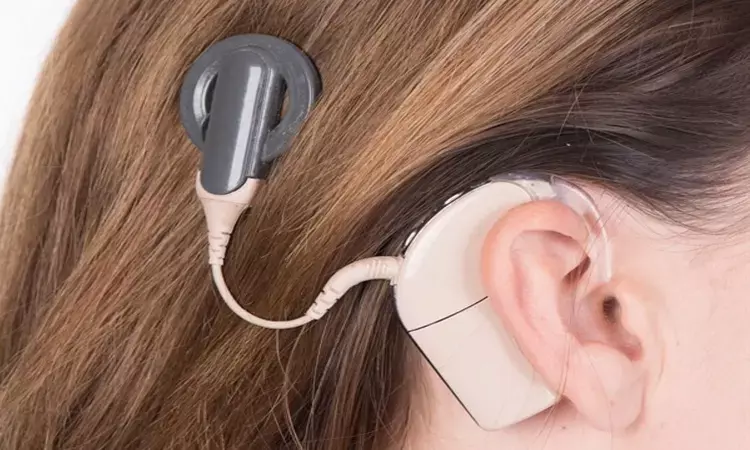- Home
- Medical news & Guidelines
- Anesthesiology
- Cardiology and CTVS
- Critical Care
- Dentistry
- Dermatology
- Diabetes and Endocrinology
- ENT
- Gastroenterology
- Medicine
- Nephrology
- Neurology
- Obstretics-Gynaecology
- Oncology
- Ophthalmology
- Orthopaedics
- Pediatrics-Neonatology
- Psychiatry
- Pulmonology
- Radiology
- Surgery
- Urology
- Laboratory Medicine
- Diet
- Nursing
- Paramedical
- Physiotherapy
- Health news
- Fact Check
- Bone Health Fact Check
- Brain Health Fact Check
- Cancer Related Fact Check
- Child Care Fact Check
- Dental and oral health fact check
- Diabetes and metabolic health fact check
- Diet and Nutrition Fact Check
- Eye and ENT Care Fact Check
- Fitness fact check
- Gut health fact check
- Heart health fact check
- Kidney health fact check
- Medical education fact check
- Men's health fact check
- Respiratory fact check
- Skin and hair care fact check
- Vaccine and Immunization fact check
- Women's health fact check
- AYUSH
- State News
- Andaman and Nicobar Islands
- Andhra Pradesh
- Arunachal Pradesh
- Assam
- Bihar
- Chandigarh
- Chattisgarh
- Dadra and Nagar Haveli
- Daman and Diu
- Delhi
- Goa
- Gujarat
- Haryana
- Himachal Pradesh
- Jammu & Kashmir
- Jharkhand
- Karnataka
- Kerala
- Ladakh
- Lakshadweep
- Madhya Pradesh
- Maharashtra
- Manipur
- Meghalaya
- Mizoram
- Nagaland
- Odisha
- Puducherry
- Punjab
- Rajasthan
- Sikkim
- Tamil Nadu
- Telangana
- Tripura
- Uttar Pradesh
- Uttrakhand
- West Bengal
- Medical Education
- Industry
New cochlear implant device ensures safety and comfort in kids during MRI

Researchers have developed a new cochlear implant device which when implanted in children can facilitate them to undergo magnetic resonance imaging (MRI) safely, with no discomfort and reduced need for sedation or anesthesia.
In most cochlear implant designs, the magnet had to be surgically removed before performing magnetic resonance imaging (MRI), and surgically replaced after the scan, because an MRI scanner also contains a powerful magnet.
A study from Ann & Robert H. Lurie Children's Hospital of Chicago found that children with a MED-EL Synchrony cochlear implant device can undergo magnetic resonance imaging safely, with no discomfort and reduced need for sedation or anesthesia. The findings of the study have been published in the peer-reviewed journal Laryngoscope.
Cochlear implants allow people who are deaf to hear, and they contain a small magnet that is used to attach an external sound processor behind the ear. In most implant designs, the magnet had to be surgically removed before magnetic resonance imaging could be performed, and surgically replaced after the scan, because an MRI scanner also contains a powerful magnet. A later strategy to avoid magnet removal used a special head wrap to counteract the force on the cochlear implant magnet from the MRI. However, patients would still report feeling uncomfortable pressure or pain during magnetic resonance imaging, which often produced anxiety.
The latest cochlear implant from MED-EL incorporates a revolutionary design change that allows the special internal magnet to rotate with the magnetic force from the MRI, making surgical removal of the magnet or a head wrap unnecessary. The greater safety and comfort level increases MRI access for children with MED-EL Synchrony cochlear implant devices.
"MRI is an increasingly important diagnostic tool, and access to MRI evaluation without pain and other complications is critical for children with cochlear implants," says lead author Nancy Young, MD, Medical Director of Audiology & Cochlear Implant Programs at Lurie Children's and Professor of Pediatric Otolaryngology at Northwestern University Feinberg School of Medicine. "Few children in our study required sedation or anesthesia during MRI, and none because they had an implant. In the past, all of our patients with cochlear implants required sedation during scanning, to avoid additional surgery to remove the magnet. This is a huge improvement, especially for children with conditions requiring repeated imaging."
The study included seven patients (ages 1.3 to 19 years) with MED-EL Synchrony cochlear implant devices, who underwent 17 episodes of 1.5 or 3.0 Tesla MRI. Seventy-six percent of MRI sessions were completed in awake patients. No patients had device-related discomfort and no magnet related complications occurred. Ninety-three percent of brain studies (13 of 14) and all body studies provided clinically useful diagnostic imaging.
To date, Lurie Children's has implanted 208 children with the MED-EL Synchrony cochlear device since it became available in 2015. More than 2000 cochlear implant surgeries have been done at Lurie Children's since the program began in 1991.
Hina Zahid Joined Medical Dialogue in 2017 with a passion to work as a Reporter. She coordinates with various national and international journals and association and covers all the stories related to Medical guidelines, Medical Journals, rare medical surgeries as well as all the updates in the medical field. Email: editorial@medicaldialogues.in. Contact no. 011-43720751
Dr Kamal Kant Kohli-MBBS, DTCD- a chest specialist with more than 30 years of practice and a flair for writing clinical articles, Dr Kamal Kant Kohli joined Medical Dialogues as a Chief Editor of Medical News. Besides writing articles, as an editor, he proofreads and verifies all the medical content published on Medical Dialogues including those coming from journals, studies,medical conferences,guidelines etc. Email: drkohli@medicaldialogues.in. Contact no. 011-43720751


